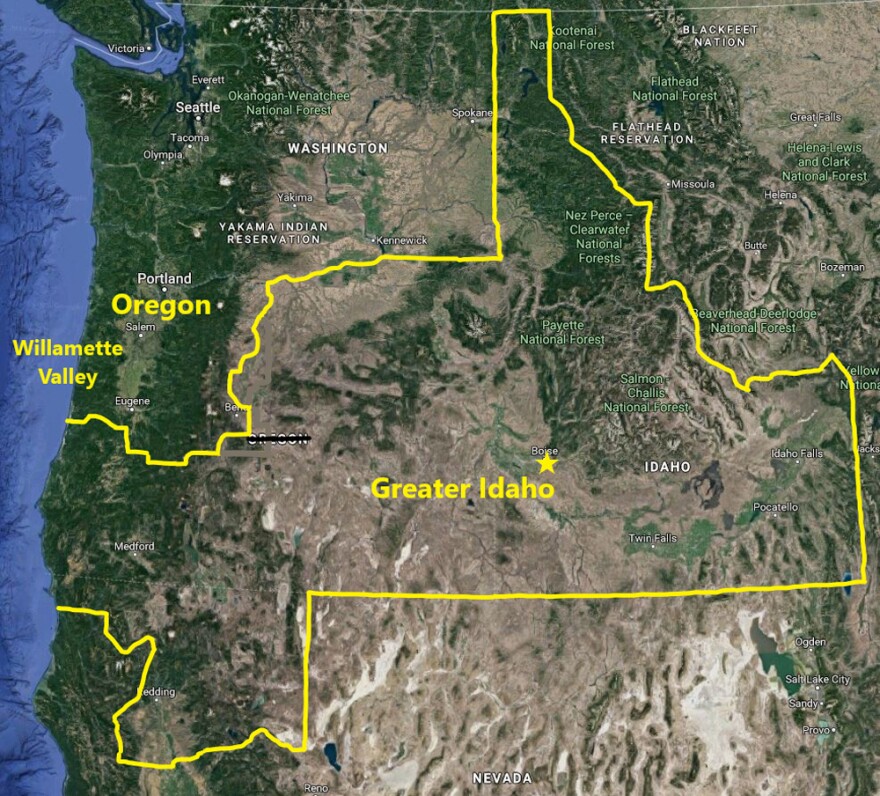Idaho legislators gave a sympathetic ear Monday to an Oregon group that wants to redraw state lines so that conservative eastern and southern Oregon would become part of the expanded state of "Greater Idaho." A separate group formed by Washington state farmers is pursuing the same idea for eastern Washington.
Two leaders of the group Move Oregon's Borders got a friendly, if somewhat cautious reception when they pitched their idea at a joint Idaho House and Senate committee hearing at the statehouse in Boise.
"We very much appreciate your coming," said House Environment, Energy & Technology Committee Chair Barbara Ehardt (R-Idaho Falls). "It's an intriguing conversation. For me, the resources and what Oregon offers is intriguing to me."
The president of Move Oregon's Border, retired nurseryman Mike McCarter of La Pine, told the Idaho lawmakers that rural Oregon residents want to associate with a state government more in tune with their values than the current liberal power structures in Salem and Portland.
"Most Oregonians live in northwest Oregon and their representatives listen to their constituents about issues surrounding that urban population," McCarter said. "If northwest Oregon wants special laws or social experiments and taxes to support these issues let them have it. But let rural Oregon go."
A recently formed Washington state political group called the Committee for Liberty, which wasn't invited to present in Boise on Monday, makes a similar argument about there being a policy divide between Democratically-controlled Olympia and the desires of eastern Washington counties.
Idaho lawmakers posed lots of questions to McCarter and his co-presenter, former Republican Speaker of the Oregon House Mark Simmons of Elgin. The border realignment advocates didn't have instant answers for what would happen to the state prisons in eastern Oregon or how to reconcile the two jurisdictions' differences on marijuana legalization.
Senate Minority Leader Michelle Stennett (D-Ketchum) noted that Idaho has a much lower minimum wage than Oregon.
"How do you blend that?" the skeptical Stennett asked. "I'm sure Oregonians don't want to be receiving $7.25 per hour if they've been receiving something higher."
"We have a lot of smart people who can work out these details," Simmons replied. "I acknowledge there are significant details... a lot of them. Where there is a will, there is a way."
Simmons and McCarter argued Idaho could benefit in multiple ways from absorbing a big chunk of Oregon. They held out the promise of increased tax revenue, job creation and better access to the Pacific Rim for exports via control of Coos Bay compared to Columbia and Snake river shipping, which is reliant on disputed dams.
There is precedent under federal law for counties to switch states, but it requires the two state legislatures to agree, plus sign off from Congress. Democrats who run the show in Salem have evinced zero interest in relocating the state boundaries with Idaho.
In a floor speech Monday, Eastern Oregon state Sen. Lynn Findley (R-Vale) urged his colleagues to acknowledge and address the frustrations of rural Oregonians or be open minded to secession. The reference to border moving did not get a rise out of the Democratic Senate majority in Salem.
"This is a longshot in many estimations," Simmons said at the Boise hearing. "We've got a lot to prove."
McCarter and Simmons said citizen initiatives on the ballot in five Oregon counties next month would carry a lot of weight for the Greater Idaho movement. Voters in Baker, Malheur, Grant, Lake and Sherman counties will weigh in on May 18 on measures that direct county commissioners to hold meetings to discuss and promote the idea of relocating the Idaho-Oregon border.
A first round of advisory votes last November in four other Oregon counties rendered a split decision in which Jefferson and Union county voters gave narrow approval and Douglas and Wallowa counties' electorates rejected the idea. The upcoming votes could be more significant because without support from the easternmost Oregon counties, any others that may want to join Idaho would be geographically cut off.
The separate group that formed in eastern Washington to advocate for moving the Idaho-Washington state line west has no plans to go to the ballot anytime soon.
"We're taking a slow, methodical approach to build our organization and base," said Committee for Liberty chair Elliott Goodrich, who is a farmer and Moses Lake school board member. "It's going to take years."
Goodrich said his political committee came together this winter, spurred in large part by a feeling that rural folks had no voice in the direction of state policy. He said the founders were appalled by proposals for taxing carbon emissions, elimination of the agriculture sector's exemption from paying overtime and legalization of simple drug possession.
In an interview, Goodrich argued that "redrawing borders is more feasible" than past, failed attempts to create an entirely new state. For many years, conservative Spokane lawmakers have introduced proposals at the state legislature to cleave Washington state into two and create a new state out of the eastern half. Those bills have never advanced.
An even longer running movement to form the new state of Jefferson out of southern Oregon and northern California has never gotten much traction either.


